how to find terminal point
TERMINAL POINTS ON THE UNIT CIRCLE
Suppose t is a real number. Let's mark off a distance t along the unit circle, starting at the point (1, 0) and moving in a counterclockwise direction, if t is positive or in a clockwise direction, if t is negative.
In this way we arrive at a point P(x, y) on the unit circle. The point P(x, y) obtained in this way is called the terminal point determined by the real number t.
Terminal Point P(x, y) Determined by t > 0 :
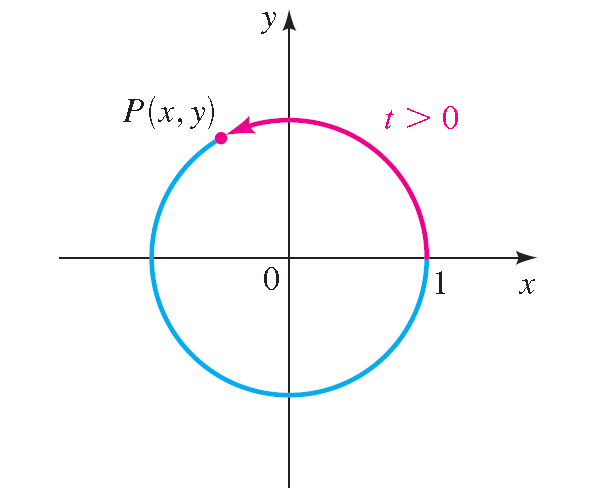
Terminal Point P(x, y) Determined by t < 0 :
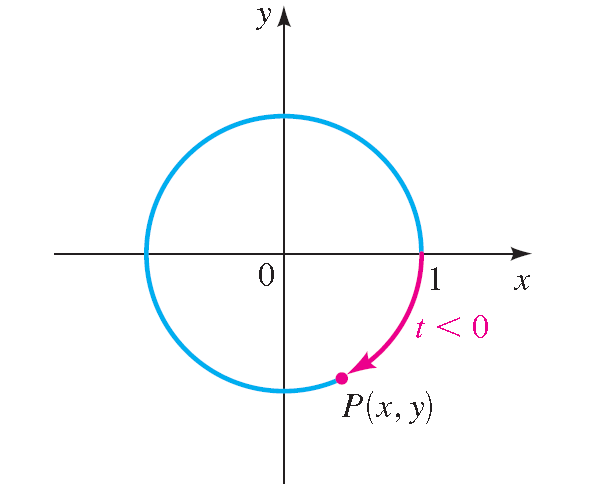
The circumference of the unit circle is
C = 2π(1) = 2 π
So, if a point starts at (1, 0) and moves counterclockwise all the way around the unit circle and returns to (1, 0), it travels a distance of 2π. To move halfway around the circle, it travels a distance of (1/2)(2π) = π.
To move a quarter of the distance around the circle, it travels a distance of (1/4)(2π) = π/2. Where does the point end up when it travels these distances along the circle? In the diagram shown below, we see, for example, that when it travels a distance ofπ starting at (1, 0), its terminal point is (-1, 0).
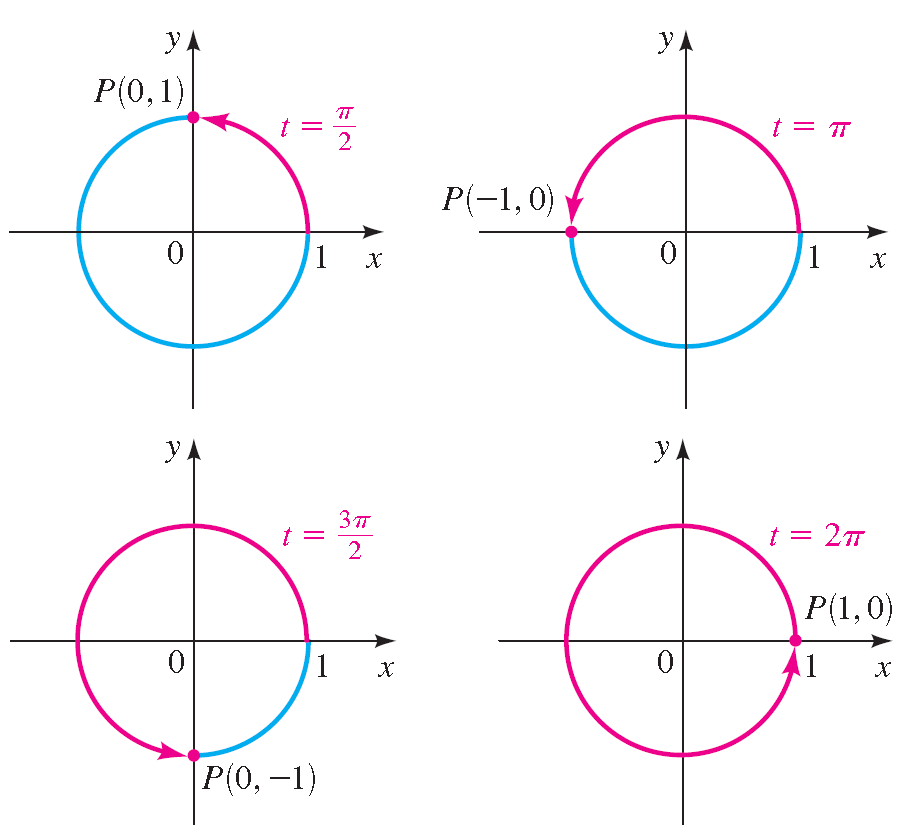
Finding Terminal Points
Find the terminal point on the unit circle determined by each real number t.
Example 1 :
t = 3π
Solution :
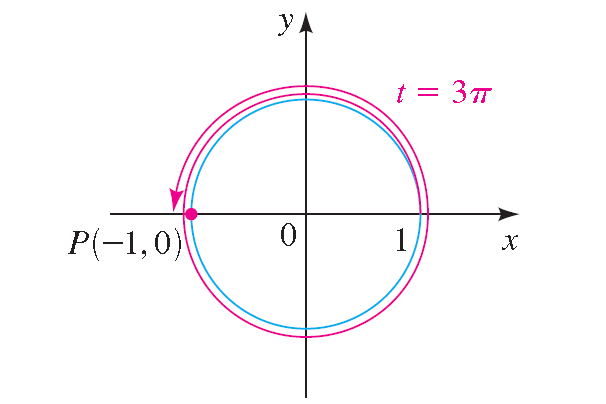
The terminal point determined by 3π is (-1, -0).
Example 2 :
t = -π
Solution :
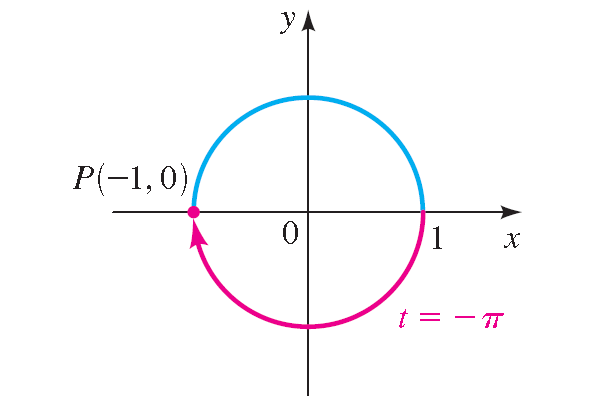
The terminal point determined by -π is (-1, -0).
Example 3 :
t = -π/2
Solution :
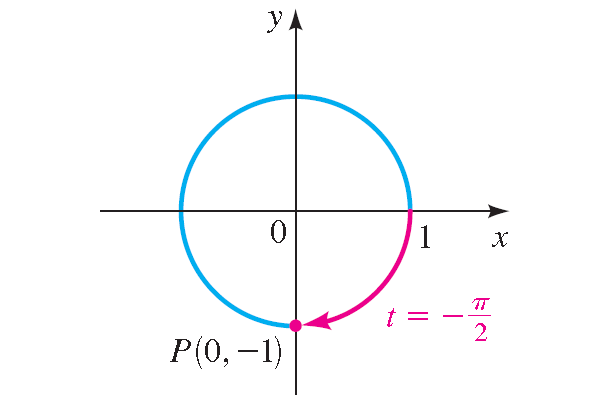
The terminal point determined by -π/2 is (0, -1).
Notice that different values of t can determine the same terminal point.
The terminal point P(x, y) determined by t =π/4 is the same distance from (1, 0) as from (0, 1) along the unit circle.
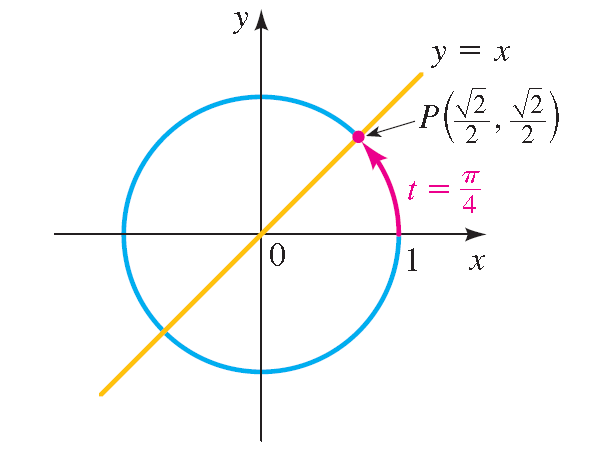
Since the unit circle is symmetric with respect to the line y = x, it follows that P lies on the line y = x. So P is the point of intersection (in the first quadrant) of the circlex 2 + y 2 = 1 and the line y = x.
Substituting x for y in the equation of the unit circle.
x 2 + x 2 = 1
2x2 = 1
x2 = 1/2
k = ± 1/√2
Because P is in the first quadrant, x = 1/√2 and y = x, we have y = 1/ √ 2 also.
Thus the terminal point determined by π/4 is
P(1/ √ 2, 1/ √ 2) = P( √ 2/2, √ 2/2)
Similar methods can be used to find the terminal points determined by t = π/6 and t = π/3.
Table :
| t 0 π/6 π/4 π/3 π/2 | Terminal point determined by t (1, 0) (√3/2, 1/2) (√2/2, √2/2) (1/2, √3/2) (0, 1) |
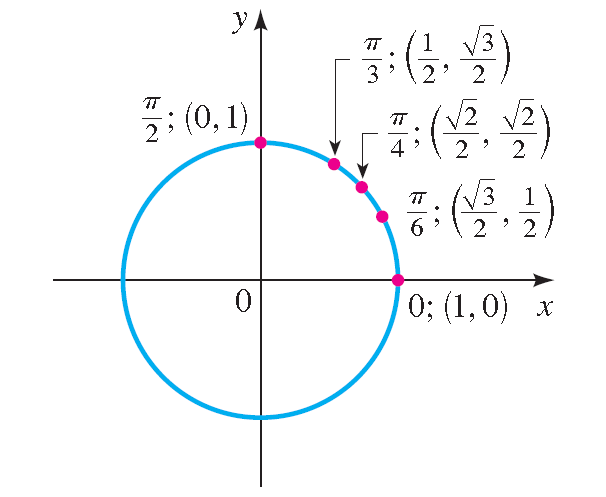
Example 4 :
t = -π/4
Solution :
Let P be the terminal point determined by - π/4, and let Q be the terminal point determined by π/4. In the diagram shown below, we see that the point P has the same coordinates as Q except for sign.
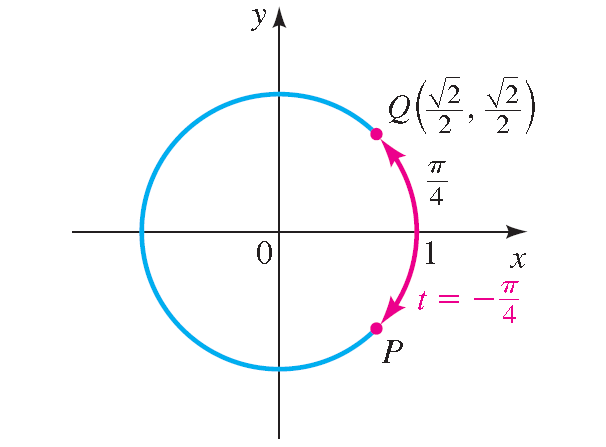
Because P is in quadrant IV, its x-coordinate is positive and its y-coordinate is negative. Thus, the terminal point is
P( √2/2, - √2/2)
Example 5 :
t = 3π/4
Solution :
Let P be the terminal point determined by 3 π/4, and let Q be the terminal point determined by π/4. In the diagram shown below, we see that the point P has the same coordinates as Q except for sign.
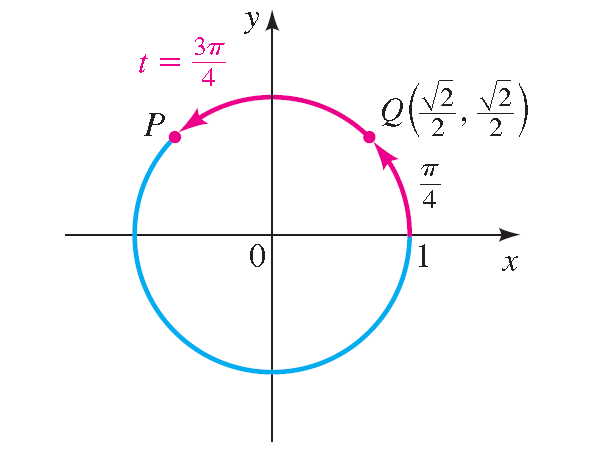
BecauseP is in quadrant II, its x-coordinate is negative and its y-coordinate is positive. Thus, the terminal point is
P(-√2/2, √2/2)
Example 6 :
t = -5π/6
Solution :
Let P be the terminal point determined by -5 π/6, and let Q be the terminal point determined by π/6. In the diagram shown below, we see that the point P has the same coordinates as Q except for sign.
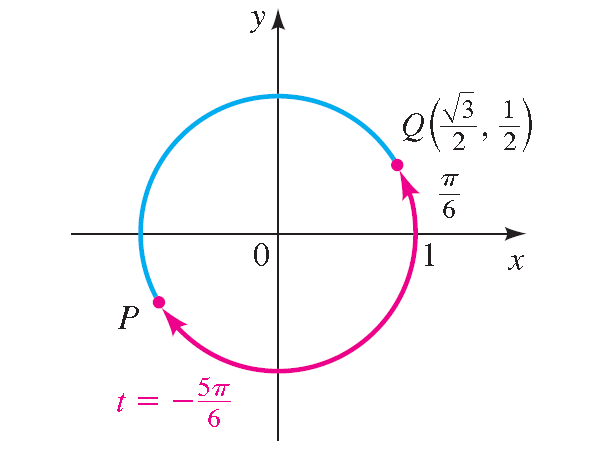
Because P is in quadrant III, its both x-coordinate and y-coordinate are negative. Thus, the terminal point is
P(- √3/2, -1 /2)
Related Stuff
1. The Unit Circle
2. Reference Number on the Unit Circle
3. Using Reference Number to Find terminal Points

Apart from the stuff given above, if you need any other stuff in math, please use our google custom search here.
If you have any feedback about our math content, please mail us :
v4formath@gmail.com
We always appreciate your feedback.
You can also visit the following web pages on different stuff in math.
WORD PROBLEMS
HCF and LCM word problems
Word problems on simple equations
Word problems on linear equations
Word problems on quadratic equations
Algebra word problems
Word problems on trains
Area and perimeter word problems
Word problems on direct variation and inverse variation
Word problems on unit price
Word problems on unit rate
Word problems on comparing rates
Converting customary units word problems
Converting metric units word problems
Word problems on simple interest
Word problems on compound interest
Word problems on types of angles
Complementary and supplementary angles word problems
Double facts word problems
Trigonometry word problems
Percentage word problems
Profit and loss word problems
Markup and markdown word problems
Decimal word problems
Word problems on fractions
Word problems on mixed fractrions
One step equation word problems
Linear inequalities word problems
Ratio and proportion word problems
Time and work word problems
Word problems on sets and venn diagrams
Word problems on ages
Pythagorean theorem word problems
Percent of a number word problems
Word problems on constant speed
Word problems on average speed
Word problems on sum of the angles of a triangle is 180 degree
OTHER TOPICS
Profit and loss shortcuts
Percentage shortcuts
Times table shortcuts
Time, speed and distance shortcuts
Ratio and proportion shortcuts
Domain and range of rational functions
Domain and range of rational functions with holes
Graphing rational functions
Graphing rational functions with holes
Converting repeating decimals in to fractions
Decimal representation of rational numbers
Finding square root using long division
L.C.M method to solve time and work problems
Translating the word problems in to algebraic expressions
Remainder when 2 power 256 is divided by 17
Remainder when 17 power 23 is divided by 16
Sum of all three digit numbers divisible by 6
Sum of all three digit numbers divisible by 7
Sum of all three digit numbers divisible by 8
Sum of all three digit numbers formed using 1, 3, 4
Sum of all three four digit numbers formed with non zero digits
Sum of all three four digit numbers formed using 0, 1, 2, 3
Sum of all three four digit numbers formed using 1, 2, 5, 6
how to find terminal point
Source: https://www.onlinemath4all.com/terminal-points-on-the-unit-circle.html
Posted by: lopezovelly59.blogspot.com

0 Response to "how to find terminal point"
Post a Comment